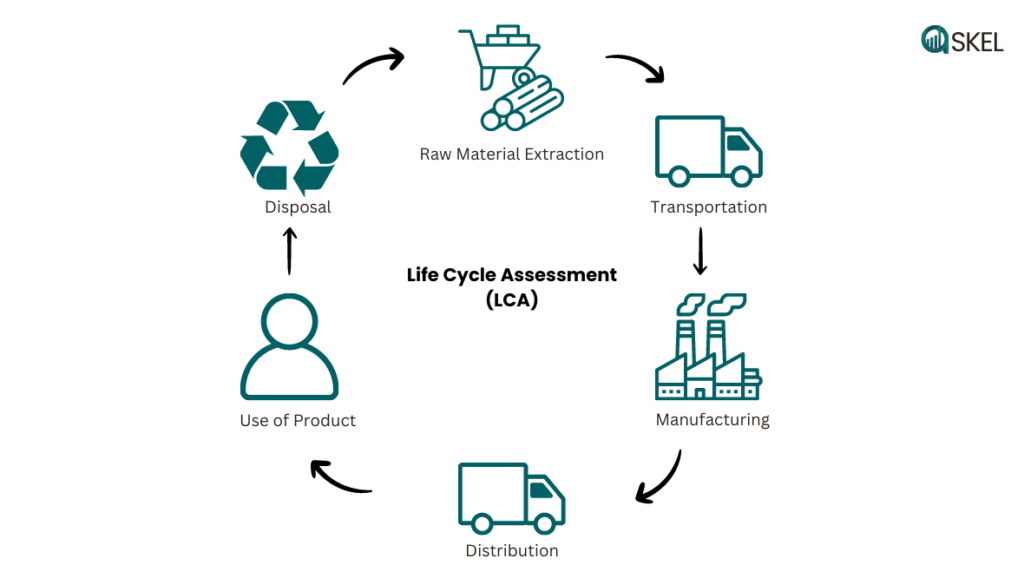Key Advantages of Conducting Life Cycle Assessment (LCA)

Gain an understanding of the various advantages that businesses can leverage through Life Cycle Assessment (LCA) in this insightful guide.
Life Cycle Assessment (LCA) is a powerful tool for evaluating the environmental impact of products or services across their entire lifespan. It provides a comprehensive view of the environmental footprint associated with each stage, from raw material extraction to production, distribution, use, and disposal.
Businesses today face mounting pressure to operate sustainably and reduce their environmental impact. With growing awareness of climate change and resource depletion, consumers, investors, and regulators are demanding greater accountability and transparency from companies. In this context, conducting Life Cycle Assessments (LCA) has emerged as a reliable practice for businesses helping them substantiate their sustainability claims, thereby showcasing credibility.
The key advantages of conducting LCA are manifold. Firstly, it enables businesses to identify areas of inefficiency and environmental impact within their operations, allowing them to implement targeted measures for improvement. By understanding the full lifecycle of their products or services, companies can optimize processes, reduce waste, and minimize resource consumption.
Secondly, LCA provides valuable insights for product development and innovation. By assessing the environmental performance of different materials, manufacturing methods, and design choices, businesses can make informed decisions to develop more sustainable products.
Enhanced Product Design and Development
Life Cycle Assessment (LCA) can help provide valuable insights into the environmental impact of various design choices. It can help identify areas for environmental improvement by assessing the environmental performance of different materials, production processes, and packaging options.
- One of the key ways LCA informs product design is through material selection. By evaluating the environmental impacts associated with different materials, such as energy consumption, resource depletion, and emissions, businesses can make informed decisions to choose more sustainable alternatives. For example, LCA may reveal that switching from conventional plastic packaging to biodegradable alternatives can significantly reduce the product’s overall environmental footprint.
- Moreover, LCA informs production processes by analyzing the environmental impacts of manufacturing methods and technologies. Companies can use this information to optimize production processes, minimize energy consumption, and reduce waste generation. For instance, LCA may show that adopting lean manufacturing practices or incorporating renewable energy sources into production can lead to significant environmental benefits.
- Additionally, LCA guides packaging choices by evaluating the environmental impacts of packaging materials and designs. Businesses can use this data to select packaging options that minimize resource use, reduce emissions, and promote recyclability or compostability. For example, LCA may demonstrate that using lightweight, recyclable materials for packaging can reduce transportation emissions and waste generation.

Transparency and Credibility
LCA data provides valuable insights into a product’s environmental footprint, allowing businesses to support sustainability claims and marketing efforts with credible evidence.
- By making LCA data accessible via product labels, marketing materials, and sustainability reports, companies can transparently communicate the environmental impacts associated with their products and services. When all stakeholders have access to comprehensive information about a product or service’s life cycle, they can make informed choices that align with their values.
- By providing all stakeholders access to comprehensive information about a product or service’s life cycle businesses can showcase transparency and demonstrate a commitment to accountability and responsible business practices. Companies that openly disclose LCA data signal awareness and accountability for their environmental impact and in turn contribute to greater transparency in the marketplace.
Reduced Environmental Risks and Costs
Life Cycle Assessment (LCA) helps businesses identify potential environmental “hotspots” within the product life cycle, thereby reducing environmental risks and costs. By conducting an LCA, companies can pinpoint areas of their operations that have the greatest environmental impact, whether it be during raw material extraction, production processes, distribution, or end-of-life disposal.
- Identifying these hotspots allows companies to prioritize areas for improvement and implement proactive measures to mitigate environmental risks. By addressing environmental concerns early in the product development process, companies can avoid potential regulatory fines and penalties associated with non-compliance with environmental regulations.
- LCA-based improvements can lead to significant cost savings for businesses. By optimizing resource use and reducing energy consumption companies can streamline their operations and lower production costs. Additionally by minimizing waste generation and improving resource efficiency, companies can also reduce their reliance on virgin materials, leading to additional cost savings and environmental benefits.
LCA study results help to promote the responsible design and redesign of products and processes, leading to reduced overall environmental impacts and the reduced use and release of more toxic materials. LCA studies identify key materials and processes within the products’ life cycles that are likely to pose the greatest impacts, including occupational and public toxicity impacts. These assessments allow businesses to make product improvements through environmentally sound process, material, and design choices.
United States Environmental Protection Agency (EPA)
Improved Supply Chain Management
Life Cycle Assessment (LCA) offers companies a valuable tool for evaluating the environmental footprint of their entire supply chain, thereby facilitating improved supply chain management. By conducting LCAs across their supply chain, companies can gain insights into the environmental impact of various stages of production, transportation, and distribution.
- LCA helps identify opportunities for collaboration with suppliers to enhance sustainability practices across the chain. By sharing LCA data and insights with suppliers, companies can work together to identify areas for improvement and implement sustainable solutions.
- A sustainable supply chain can enhance a company’s overall brand image. Consumers are increasingly prioritizing sustainability when making purchasing decisions, and companies with transparent and environmentally responsible supply chains are perceived more favorably by consumers.


